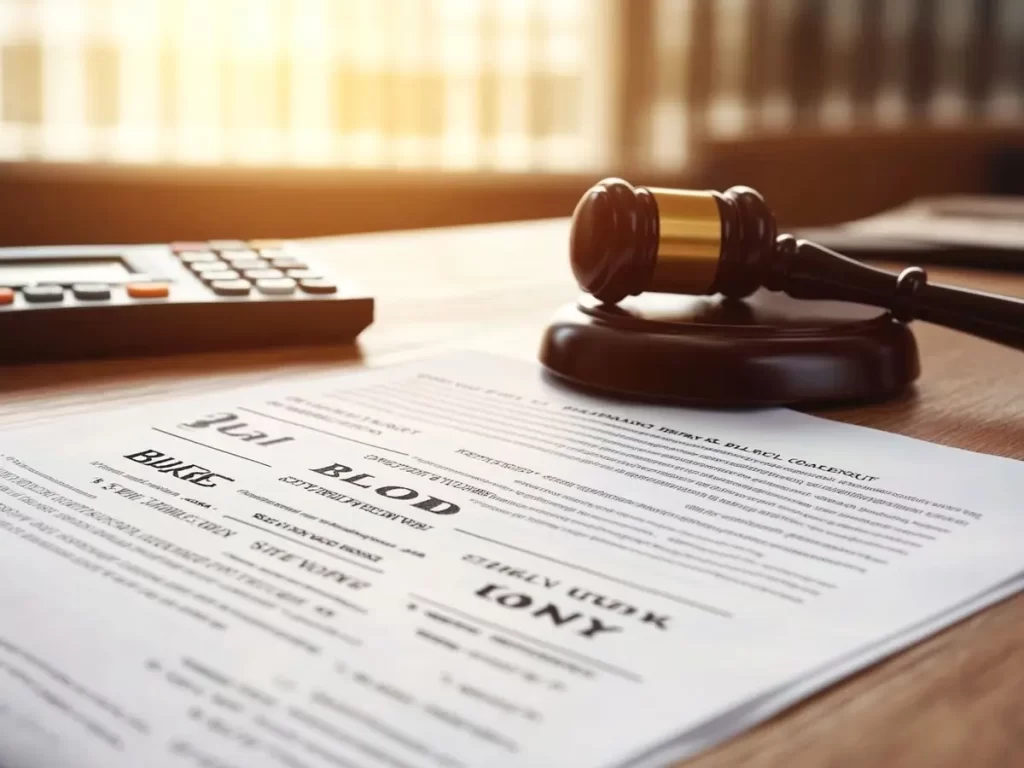Quick Answer: How Utah Bail Bonds Work
Utah bail bonds allow defendants to be released from jail for 10% of the total bail amount. When someone is arrested in Utah, a judge sets bail based on the crime and defendant’s history. Instead of paying the full amount, you can hire a licensed bail bondsman who charges a non-refundable fee of 10-20% (typically 10%) to post the full bail with the court. The defendant must appear at all court dates or the bail is forfeited.
Understanding Utah’s Bail Bond Process: Step-by-Step
What Happens After an Arrest in Utah
When someone is arrested in Utah, they’re taken to the local county jail for booking. The booking process typically takes 1-3 hours and includes:
- Fingerprinting and photographing
- Recording personal information
- Checking for warrants
- Determining bail amount based on Utah’s Uniform Bail Schedule
How Bail Amounts Are Set
Utah judges set bail amounts using these factors:
- Crime severity – Felonies have higher bail than misdemeanors
- Criminal history – First offenders typically receive lower bail
- Flight risk – Local residents with jobs get lower bail
- Community safety – Violent crimes result in higher bail
- Utah’s Uniform Bail Schedule – Provides standard amounts for common offenses
Common bail amounts in Utah:
- DUI first offense: $1,500-$5,000
- Drug possession: $2,500-$10,000
- Assault: $5,000-$25,000
- Felony theft: $10,000-$50,000
How Much Do Bail Bonds Cost in Utah?
Utah Bail Bond Calculator
Use our simple calculator to determine your bail bond cost:
| Total Bail Amount | Premium Rate (10%) | You Pay |
|---|---|---|
| $1,000 | 10% | $100 |
| $5,000 | 10% | $500 |
| $10,000 | 10% | $1,000 |
| $25,000 | 10% | $2,500 |
| $50,000 | 10% | $5,000 |
| $100,000 | 10% | $10,000 |
| $250,000 | 10% | $25,000 |
| $500,000 | 10% | $50,000 |
| $1,000,000 | 10% | $100,000 |
Important: The 10% premium is non-refundable, even if charges are dropped or the defendant is found not guilty. This fee is how bail bondsmen stay in business and assume the risk of the full bail amount.
Payment Options Available
Can’t afford the full premium? Utah bail bondsmen offer:
- Payment plans – Pay in installments over 3-12 months
- Credit card payments – Most accept major credit cards
- Collateral options – Use property, vehicles, or valuables
- Co-signer arrangements – Share financial responsibility

Getting Someone Out of Jail in Utah: The Process
Step 1: Contact a Licensed Utah Bail Bondsman
Call a bail bondsman immediately after arrest. They’re available 24/7 and can start the process right away. Provide:
- Defendant’s full name and date of birth
- Jail location (Salt Lake County, Utah County, Davis County, Weber County)
- Booking number if available
- Charges and bail amount
Step 2: Complete the Paperwork
Required documents include:
- Bail bond application – Basic information about defendant and co-signer
- Indemnity agreement – Legal contract outlining responsibilities
- Payment receipt – Proof of premium payment
- Collateral agreements – If using property or assets
Step 3: Bondsman Posts Bail
Once paperwork is complete and payment received, the bondsman posts the full bail amount with the court. This process takes:
- Salt Lake County Jail: 3-8 hours for release
- Utah County Jail: 1-3 hours for release
- Davis County Jail: 30 minutes-2 hours for release
- Weber County Jail: 1-2 hours for release
Step 4: Defendant Release and Obligations
After release, the defendant must:
- Appear at ALL scheduled court dates
- Check in with the bail bondsman as required
- Not leave Utah without permission
- Follow all court-ordered conditions
Types of Bail Bonds Available in Utah
Cash Bail
Pay the full bail amount directly to the court in cash. Money is returned after case completion minus court fees.
Best for: Small bail amounts under $5,000
Surety Bond
Work with a bail bondsman who posts bail for a 10% fee. Most common type in Utah.
Best for: Most defendants who can’t afford full cash bail
Personal Recognizance (PR Bond)
Released on your promise to appear without paying bail. Judge’s discretion based on:
- Strong community ties
- Stable employment
- No criminal history
- Non-violent offense
Best for: First-time offenders with minor charges
Property Bond
Use real estate as collateral. Property must have equity worth 150% of bail amount.
Best for: High bail amounts when cash isn’t available

What Happens If You Miss Court in Utah?
Missing a court date triggers serious consequences:
- Immediate bench warrant – Judge issues warrant for arrest
- Bail forfeiture – Full bail amount becomes due
- Additional charges – “Failure to appear” added to original charges
- Bounty hunters – Bail bondsman may hire recovery agents
- Co-signer liability – Co-signer must pay full bail amount
How to Fix a Missed Court Date
Act immediately if you miss court:
- Contact your bail bondsman within 24 hours
- Call your attorney or public defender
- Turn yourself in voluntarily (shows good faith)
- Request a new court date with valid excuse
Utah Bail Bonds by Location
Salt Lake County – Highest Arrest Volume
Cities Served: Salt Lake City, West Valley City, West Jordan, Sandy, South Jordan, Taylorsville, Murray
- Salt Lake County Metro Jail: 3965 S 900 W, South Salt Lake, UT 84119
- Phone: 385-4668-8400
- Average processing time: 3-8 hours
- Bail hearings: Daily at 8:30 AM and 1:30 PM
- Special considerations: Busiest jail in Utah, expect delays
- Common arrests: DUI, drug possession, domestic violence, theft
- Map to Jail: https://maps.app.goo.gl/vathNVaRkkuuKdKm8
West Valley City (2nd largest city in Utah)
- High volume of arrests for property crimes and DUIs
- Defendants processed through Salt Lake County Jail
- Consider bail bondsmen with West Valley offices for faster service
West Jordan
- Growing population means increasing arrests
- Primarily drug and domestic violence cases
- Same jail as Salt Lake City but may have separate court dates
Utah County Bail Bonds
Cities Served: Provo, Orem, Lehi, American Fork, Spanish Fork, Pleasant Grove
- Utah County Jail: 3075 N Main St, Spanish Fork, UT 84660
- Phone: 801-851-4200
- Average processing time: 1-3 hours
- Bail hearings: Weekdays at 9:00 AM
- Special considerations: Faster processing than Salt Lake
- Common arrests: College-related offenses, DUI, drug possession
- Map to Jail: https://maps.app.goo.gl/qxVBa1mqJx5nW48S8
Provo (BYU area)
- High volume of alcohol and drug-related arrests
- Student population means more first-time offenders
- Judges often grant PR bonds for students with clean records
Orem
- Family-oriented city with lower crime rates
- Mostly DUI and domestic disputes
- Quicker release times due to lower jail population
Davis County Bail Bonds
Cities Served: Layton, Bountiful, Clearfield, Kaysville, Farmington
- Davis County Jail: 800 W State St, Farmington, UT 84025
- Phone: 801-451-4100
- Average processing time: 30 minutes-2 hours
- Bail hearings: Monday through Friday at 8:30 AM
- Special considerations: Efficient processing, lower volume
- Common arrests: DUI (I-15 corridor), domestic violence
- Map to Jail: https://maps.app.goo.gl/uFBMcyp12RFuJ38R7
Layton (Largest city in Davis County)
- Hill Air Force Base proximity means military-related cases
- Interstate drug trafficking arrests common
- Bail amounts often higher for out-of-state defendants
Weber County Bail Bonds
Cities Served: Ogden, Roy, Clearfield (partial), North Ogden
- Weber County Jail: 721 W 12th St, Ogden, UT 84401
- Phone: 801-778-6700
- Average processing time: 1-2 hours
- Bail hearings: Monday, Wednesday, Friday
- Special considerations: Smaller facility, quicker release
- Common arrests: Drug crimes, assault, theft
- Map to Jail: https://maps.app.goo.gl/KyoudtPVkNKijScc8
Washington County Bail Bonds
Cities Served: St. George, Washington, Hurricane, Cedar City
- Washington County Jail: 620 S 5300 W, Hurricane, UT 84737
- Phone: 435-656-6600
- Average processing time: 30 minutes-1 hour
- Bail hearings: Tuesday and Thursday
- Special considerations: Fastest processing in Utah
- Common arrests: Tourist-related DUIs, domestic violence
- Map to Jail: https://maps.app.goo.gl/bmD6DgZ1bDGyUmVZ7
Cache County Bail Bonds
Cities Served: Logan, North Logan, Smithfield
- Cache County Jail: 1225 W Valley View, Logan, UT 84321
- Phone: 435-755-1000
- Average processing time: 1-2 hours
- Bail hearings: Weekdays at 9:00 AM
- Special considerations: Utah State University area
- Common arrests: College-related offenses, agricultural crimes
- Map to Jail: https://maps.app.goo.gl/1xPzduAyeSGiuhz37
Why Choose a Licensed Utah Bail Bondsman?
Working with a licensed bail bondsman provides:
- 24/7 availability – Arrests happen anytime
- Fast jail release – They know the system
- Payment flexibility – Options beyond full cash such as bail financing
- Legal knowledge – Understanding of Utah laws
- Court date reminders – Helps avoid missed appearances
Verify Utah Bail Bond Licensing
Always verify your bondsman is licensed through:
- Utah Department of Insurance website
- License number on all contracts
- Better Business Bureau ratings
- Online reviews and testimonials
Important Legal Information
This guide provides general information about Utah bail bonds. Every case is unique. For specific legal advice, consult with:
- Licensed Utah bail bondsman
- Criminal defense attorney
- Public defender’s office
- Utah State Courts website
Remember: The information provided here is for educational purposes. Laws change, and individual circumstances vary. Always verify current regulations with official sources.
Last Updated: August 2025 Utah Bail Bond License Verification: Utah Department of Insurance

Frequently Asked Questions About Utah Bail Bonds

How do bail bonds work in Utah and what is the Uniform Bail Schedule?
When a person is arrested in Utah, they are taken to a local jail, such as Salt Lake County Jail, Utah County Jail, Davis County Jail, or Weber County Jail, where they will await their trial. In order to be released on bail, the defendant or their family can pay the full cash bail amount, which can be quite expensive. Alternatively, they can seek the help of a local bail agent who will pay the full bail amount on their behalf for a non-refundable fee. This allows the defendant to be released from jail while they await their trial. Judges set bail amounts according to the Uniform Bail Schedule and the defendant’s history.
What is the process of getting a bail loan in Utah and what role does a surety play?
If the defendant or their family cannot afford to pay the full bail amount or the fee charged by a bail bond agent, they can apply for a bail loan. This involves working with a lender or a surety who will provide the funds to pay the full bail amount. In return, the defendant or their family will make payments to the lender until the full amount is repaid. The Utah Code may provide specific guidance on how these financial arrangements are structured.
How can I pay for bail in Utah, and what are the options like personal recognizance?
There are a few options for paying for bail in Utah. You can pay the full cash bail amount, seek the help of a bail bond agent who will charge a non-refundable fee, or apply for a bail loan. In some cases, a defendant might be released on personal recognizance, which does not require payment of bail. It’s important to carefully consider your financial situation before deciding which option is best for you.
How can I find bail bonds near me in Salt Lake City, West Valley City, West Jordan, Provo, and St. George Utah, and what organizations can help?
If you or a loved one is in need of a bail bond in any of these cities, the best way to find one is to search online. Look for reputable bail bond companies with positive reviews and a strong track record of helping clients. Organizations like the American Bail Coalition can provide guidance. You can also ask for recommendations from friends or family who may have experience with bail bonds in Utah.
What happens to the bail bond if the defendant fails to appear in court and what actions can a bounty hunter take?
If the defendant fails to appear in court, the bail bond will be forfeited and the bail bond agent will be responsible for paying the full bail amount to the court. This means that the defendant or their family will still owe the bail bond agent the non-refundable fee, and the defendant will likely face additional legal consequences for missing their court date. In such cases, a bounty hunter may be employed to locate and return the defendant to custody.
Can I get a bail bond for any type of crime in Utah and what are the exceptions?
In most cases, a bail bond can be obtained for any type of crime in Utah, with a few exceptions. Some crimes, such as capital offenses, may require the defendant to remain in custody until their trial. It’s best to consult with a bail bond agent to determine if a bail bond can be obtained for a specific crime. The bail process and exceptions are often outlined in the Utah Code.
Do I get my bail money back after the criminal case is done?
The short answer is no. The premium you paid is much like paying an insurance premium. You don’t have to provide 100% of the bail while the bondsman is assuming the risk should the defendant fail to appear for court.
All About Utah Bail Bonds
Do I get my bail money back in Utah?
No, the 10% premium paid to a bail bondsman is non-refundable. This is their fee for taking the financial risk. If you paid full cash bail directly to the court, you’ll get most back after the case ends, minus court fees.
Can I leave Utah while on bail?
You need permission from both the court and your bail bondsman to leave Utah. Leaving without permission violates bail conditions and can result in arrest.
What if I can’t afford any bail bond?
Options include:
- Request a bail reduction hearing
- Apply for a public defender who can argue for lower bail
- Ask about personal recognizance release
- Look for bail assistance programs through local churches or nonprofits
How long does bail last?
Bail lasts until the case is resolved through:
- Charges being dropped
- Plea agreement accepted
- Trial verdict rendered
- Sentencing completed
Can bail be revoked?
Yes, judges can revoke bail for:
- Committing new crimes
- Violating bail conditions
- Threatening witnesses
- Failing drug tests (if required)
What’s the difference between bail and bond?
Bail is the total amount set by the judge. Bond is the guarantee provided to the court (either cash or through a bondsman) that ensures the defendant appears.

